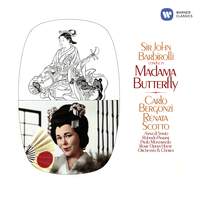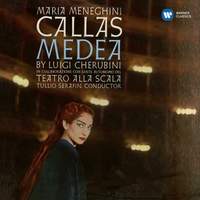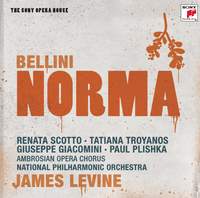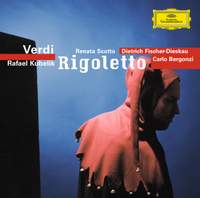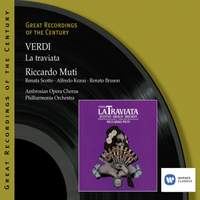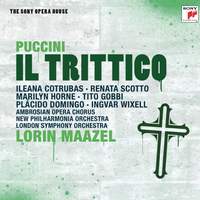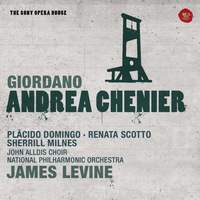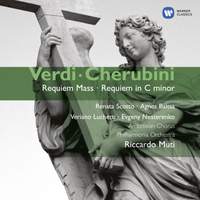Obituary,
Renata Scotto (1934-2023)
The daughter of a policeman and a seamstress, Scotto was born in 1934 in Savona; she later described the Northern Italian seaport as ‘a dangerous place to be’ during her childhood due to the rise of fascism, and shortly after the outbreak of World War Two she moved to the relative safety of Tovo San Giacomo with her mother and older sister. Her instinctive love of music was nurtured by her uncle Salvatore, and by the time her age was in double figures she was singing popular songs and operatic arias out of her apartment-window in exchange for sweets from the neighbours.
It was Salvatore who took twelve-year-old Renata to her first opera, a performance of Rigoletto at the Teatro Chiabrera with Tito Gobbi in the title-role. Scotto decided then and there that opera was her vocation; although she recounts in her autobiography that there were ‘no books and not much to eat’, the family clubbed together to buy her an upright piano and she threw herself into studying operatic repertoire at home. (She went on to sing Gilda opposite Gobbi on numerous occasions).
Milan was the obvious destination for an aspiring young singer looking to pursue formal training, but as private accommodation in a big city would have stretched the family finances beyond breaking-point Scotto took up lodgings in a convent by the Duomo. Although she described the atmosphere as ‘somewhere between a jail and a very austere kindergarten’, she would later draw on the experience in her interpretations of two Puccini roles which featured prominently in her career: Suor Angelica and Manon Lescaut.
A competition-win in 1952 provided Scotto with the opportunity to sing her first complete role, Violetta in La traviata, at Milan’s Teatro Nuovo; ‘Uncle Sal’ again came up trumps in the run-up to the engagement, arranging for Scotto to sing a dry run of the opera on home turf (at the same theatre where Gobbi’s Rigoletto had so transfixed her a few years earlier). Scotto acquitted herself with flying colours, and opportunities began to flow – including a concert in Pesaro with her childhood inspiration Beniamino Gigli, and her first Madama Butterflys in Savona and Venice.
As an ambitious young singer based in Milan, Scotto naturally had her sights set on La Scala, and in December 1953 she made her house-debut in the trouser-role of Walter (wearing a prosthetic nose which she despised!) in Catalani’s La Wally under Carlo Maria Giulini. Although she recounts having learned a great deal from sharing a stage with Renata Tebaldi and Mario Del Monaco (she even received her first driving-lesson from the latter!), Scotto was already hankering after bigger roles than La Scala was prepared to entrust to an early-career singer; rather than accepting more comprimario roles in Milan she forged ahead elsewhere, trying out new repertoire in Cairo and Venice, and refining a technique that was not yet completely water-tight.
Her friend and colleague Alfredo Kraus pointed her in the direction of Spanish soprano Mercedes Llopart, who schooled her thoroughly in Mozart, bel canto style and – perhaps more surprisingly – Russian repertoire: Lisa in Tchaikovsky’s Pique Dame (always sung in Italian) became something of a calling-card at this stage in her career.
It was at the Edinburgh Festival in 1957 that Scotto had her major international breakthrough: engaged to understudy Maria Callas (with whom she was already booked to record Cherubini’s Medea for EMI) in Bellini’s La sonnambula, Scotto stepped into the limelight when La Divina declined to sing an additional performance which was scheduled due to popular demand. (Callas assured reporters that her young colleague would ‘cover herself in glory’, though the press would continue to pit the two divas against one another even after Callas’s death). Scotto took a dozen curtain-calls before the conductor Antonino Votto begged the audience’s indulgence – the newly-born star had to depart for her first session in the recording-studio early the next day.
The lead violinist at that recording-session was a relatively new recruit to the La Scala orchestra, Lorenzo Anselmi, and after a first date involving a windswept game of mini-golf the pair soon became inseparable; Scotto credited Anselmi with taking her musicianship to new heights, and trusted him as her second pair of ears for the rest of her career. They married in 1960.
Bel canto roles (including Donizetti’s Lucia di Lammermoor, Bellini’s Norma and Isabelle in Meyerbeer’s Robert le Diable) figured heavily in Scotto’s career throughout the 1960s, though Butterfly remained something of a constant and it was in that role that she made her Metropolitan Opera debut in 1965. One critic breathlessly reported that ‘it was love at first sight between Miss Scotto and the New York audience’, but her relationship with the house was not always plain sailing: Scotto clashed with general manager Rudolf Bing about his reluctance to let her expand her repertoire, although the tide turned in her favour under the directorship of Anthony Bliss and James Levine (with whom she made many of her finest recordings).
Scotto eventually chalked up twenty-five roles (including the three heroines of Il trittico, Vitellia in La clemenza di Tito, Ponchielli’s La Gioconda and Elisabetta in Verdi’s Don Carlos) at the Met over the next two decades - and from the mid-1970s she made New York (specifically Westchester) her base, after a terrifying burglary at the family home in Gonzago prompted them to leave Italy.
A compelling vocal actress (seeing how viscerally Callas inhabited her roles in her formative years had made a profound impression), she thrived under the camera once filmed productions became a semi-regular occurrence: in 1977 she sang Mimì opposite Luciano Pavarotti in the Met’s first-ever telecast, a production of La bohème by Fabrizio Melano. Seeing herself on-screen spurred Scotto to overhaul her approach to exercise and diet, which she found challenging due to her love of pasta and memories of food-scarcity as a child – she remarks waspishly in her autobiography that ‘the experience apparently did not affect the tenor of the evening in the same way’. (By this stage there was little love lost between Scotto and Pavarotti, whose ‘musical irresponsibility’ she found intensely frustrating).
In the later stages of her career, Scotto moved away from the bel canto repertoire and focused on carefully-chosen lyric-dramatic roles: that steely core to the voice which was already evident in her early recordings of coloratura heroines was deployed to great effect in verismo roles such as Zandonai’s Francesca da Rimini, Maddalena in Giordano’s Andrea Chénier, Cilea’s Adriana Lecouvreur and Puccini’s Manon Lescaut and Tosca (though she stressed that she never personally identified with the latter character: ‘ ‘Vissi d’arte’ is not my song. I have a life outside the theatre.’) She even made several forays into dramatic mezzo territory towards the end of her career on stage, including Strauss’s Klytaemnestra, and Madame Flora in Giancarlo Menotti’s The Medium (the composer was also one of her favourite stage-directors).
Grand farewells weren’t Scotto’s style, and instead she transitioned gradually away from the stage and into the role of director: always strongly invested in the dramaturgy of each production and keen to bring her own ideas to the stage, it seemed a natural segue. (As early as that breakthrough Sonnambula in Edinburgh, she had insisted on putting her own spin on costuming and characterisation). Her productions were mounted at houses including the Metropolitan Opera (where she became the first woman to direct an opera in which she also starred), the Lyric Opera of Chicago, Dallas Opera and the Finnish National Opera; her staging of Poulenc’s La voix humaine and La dame de Monte-Carlo was performed in her hometown only last month.
Scotto also devoted much of her energy to teaching in her later years, insisting that opera ‘will not die when I am gone. It lives on, as it must, in new voices’; her pupils included sopranos Janice Watson, Rosa Feola and Othalie Graham, and the dramatic mezzo Michelle De Young. She is survived by her two children, Laura and Filippo.
Renata Scotto - a selected discography
Renata Scotto (Cio Cio San), Carlo Bergonzi (Pinkerton), Anna di Stasio (Suzuki), Rolando Panerai (Sharpless) & Silvana Padoan (Kate Pinkerton), Piero De Palma (Goro)
Coro e Orchestra del Teatro dell’Opera di Roma, John Barbirolli
Available Formats: 2 CDs, MP3, FLAC
Maria Callas (Medea), Renata Scotto (Glauce), Mirto Picchi (Giasone), Miriam Pirazzini (Neris), Giuseppe Modesti (Creonte)
Orchestra and Chorus of La Scala Milan, Tullio Serafin
Available Formats: MP3, FLAC, Hi-Res FLAC
Renata Scotto (Norma), Tatiana Troyanos (Adalgisa), Giuseppe Giacomini (Pollione), Paul Plishka (Oroveso), Ann Murray (Clotilde), Paul Crook (Flavio)
Ambrosian Opera Chorus & National Philharmonic Orchestra, James Levine
Available Formats: MP3, FLAC
Dietrich Fischer-Dieskau (Rigoletto), Renata Scotto (Gilda), Carlo Bergonzi (Il Duca), Fiorenza Cossotto (Maddalena), Ivo Vinco (Sparafucile)
Coro e Orchestra del Teatro alla Scala, Rafael Kubelik
Available Formats: MP3, FLAC
Renata Scotto (Violetta Valéry), Alfredo Kraus (Alfredo Germont), Renato Bruson (Giorgio Germont)
Philharmonia Orchestra, Ambrosian Opera Chorus, Band of the Royal Marines, Riccardo Muti
Available Formats: MP3, FLAC
Renata Scotto (Giorgetta/Suor Angelica), Plácido Domingo (Luigi/Rinuccio), Marilyn Horne (La Zia Principessa),
Available Formats: MP3, FLAC
Plácido Domingo (Andrea Chénier), Renata Scotto (Madeleine di Coigny), Sherrill Milnes (Carlo Gérard), Maria Ewing (Bersi), Jean Kraft (La Contessa di Coigny), Gwendolyn Killebrew (Madelon), Allan Monk (Roucher)
John Alldis Choir & National Philharmonic Orchestra, James Levine
Available Formats: MP3, FLAC
Renata Scotto (soprano), Agnes Baltsa (mezzo), Veriano Luchetti (tenor), Evgeny Nesterenko (bass)
Philharmonia Orchestra & Ambrosian Chorus, Riccardo Muti
Available Formats: MP3, FLAC



